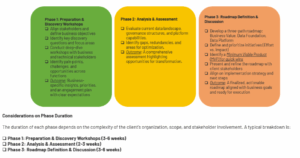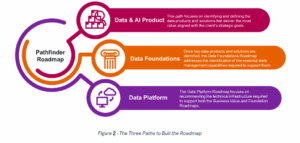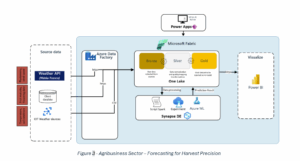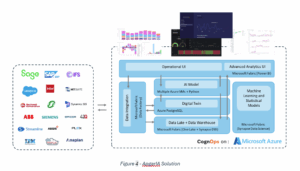AI
Apgar Pathfinder for Microsoft Azure


In 16 June 2025
Apgar Pathfinder for Microsoft Azure
An Actionable Roadmap to Unlock the Value of Data and AI
Organizations today are under increasing pressure to leverage data and AI to improve performance, agility, and innovation. Yet many face the same core challenges: Where do we start? What should we prioritize? How do we align technical capabilities with business value?
Apgar Pathfinder for Microsoft Azure was built to answer these questions. It is a structured, strategic engagement designed to define an actionable roadmap for data transformation to support execution by creating clarity, alignment, and direction. It leverages the full power of Microsoft Azure while drawing on Apgar’s deep expertise in data governance, platform architecture, and business value enablement.
This is not a theoretical framework or a long-term consulting program. It is a focused engagement that produces a clear, practical, and prioritized plan. The goal: empower clients to move forward with confidence, using Azure effectively and purposefully.
A Three-Phase Engagement Model
Apgar Pathfinder for Microsoft Azure follows a step-by-step model, designed to connect strategic intent with execution readiness. Each phase adds depth and focus, ensuring that the final roadmap is realistic, sequenced, and aligned with both business and technical stakeholders.
Phase 1: Preparation & Discovery Workshops
The first phase establishes alignment across business and technical stakeholders and frames the engagement around the organization’s strategic priorities. Apgar facilitates collaborative workshops to identify key challenges and opportunity areas.
Key activities:
- Align on business objectives and define value drivers
- Identify key discovery questions and focus areas
- Conduct deep-dive sessions across business, IT, and data teams
- Capture functional pain points and transformation levers
Outcome: Business-specific insights, priority areas, and a shared engagement plan with clear scope and expectations.
Phase 2: Analysis & Assessment
This phase focuses on assessing the current state of the data landscape, governance model, and platform capabilities—particularly within Azure. Gaps, redundancies, and dependencies are identified and mapped to transformation objectives.
Key activities:
- Analyze data architecture, tools, and processes
- Evaluate governance structure, quality controls, and security models
- Assess Azure service usage and readiness for AI, analytics, and integration
Outcome: A comprehensive, objective view of the current state and a clear identification of opportunities and gaps.
Phase 3: Roadmap Definition & Discussion
The final phase defines the strategic roadmap, structured across three paths: Business Value Path, Data Foundations Path, and Data Platform Path. Initiatives are prioritized based on effort and impact. A Minimum Viable Product (MVP) is identified to demonstrate value early.
Key activities:
- Define initiatives across the three paths
- Prioritize based on business impact and implementation feasibility
- Align stakeholders on execution strategy and investment focus
- Validate and refine the roadmap collaboratively
Outcome: A sequenced, actionable roadmap aligned with strategic priorities and fully ready to support execution.

The Paths of Apgar Pathfinder
Business Value Path
This path identifies high-value use cases that can deliver measurable impact and serve as the foundation for further transformation. These are initiatives that are feasible, aligned with business goals, and ready to deliver short-term value.
Typical use cases include:
- Predictive analytics for supply chain, sales, or maintenance
- AI-powered planning and decision intelligence using ApgarIA
- Generative AI copilots for customer service, HR, or document processing
- Operational dashboards integrating data from ERP, CRM, and external sources
These solutions typically leverage Azure Synapse, Power BI, Azure Machine Learning, and Azure OpenAI Services.
This path also defines the MVP—often delivered within the first 90 days of execution.
Data Foundations Path
Scalable success with AI and data products depends on the availability of trusted, governed, and compliant data. This path defines what must be in place to ensure consistency, traceability, and regulatory alignment.
Common components of this path include:
- Data governance frameworks and stewardship models
- Master and reference data management (MDM/RDM)
- Metadata cataloging and lineage tracking with Microsoft Purview
- Data privacy controls and workflow automation (GDPR, HIPAA, etc.)
- Data literacy and usage enablement across teams
Solutions from Microsoft (Purview, AAD) and partners (Semarchy, DataGalaxy, CluedIn) are referenced, supported by Apgar’s own Business Solutions for RDM, MDM, Data Catalog and privacy governance.
Data Platform Path
The Data Platform Path defines the technical architecture needed to support the roadmap. It ensures the environment is secure, scalable, and aligned with Azure best practices.
Key elements typically include:
- Unified ingestion and orchestration using Azure Data Factory and Event Hubs
- Scalable storage and compute through Microsoft Fabric, Synapse, and Data Lake
- Secure access and monitoring via Azure Key Vault and Azure Monitor
- Integration frameworks for hybrid or multi-cloud environments
- Support for AI/ML and GenAI workloads across structured and unstructured data
Apgar provides platform reference models and deployment blueprints to inform implementation—but does not execute the build within the Pathfinder scope.

How Organizations Use Apgar Pathfinder for Microsoft Azure
Agribusiness Sector – Forecasting for Harvest Precision
A company in the agribusiness sector needed to modernize its harvest planning process. Manual observations and historical averages led to inefficiencies, inconsistent timing, and waste.
Apgar Pathfinder helped define a roadmap for implementing a predictive harvest model. The Business Value Path focused on AI forecasting using weather and soil data. The Data Foundations Path defined data quality rules and lineage tracking across sensors and APIs. The Data Platform Path proposed real-time ingestion pipelines, Azure Machine Learning for model training, and Power BI dashboards for planners.
The organization was able to initiate the MVP within weeks, backed by a clear plan to scale the solution regionally.

Manufacturing Sector – AI-Based Planning with ApgarIA
A global manufacturer sought to improve production planning across dozens of sites. Existing processes were time-consuming and highly dependent on a few expert planners.
Apgar Pathfinder was used to define the roadmap for deploying ApgarIA, an AI-powered planning assistant running on Microsoft Azure. The Business Value Path defined the planning engine and simulation model. The Data Foundations Path addressed data unification across ERP, MES, and CRM. The Data Platform Path defined an architecture built on Fabric, Synapse, and Azure ML, with observability and security by design.
The result: a clear, phased roadmap that accelerated stakeholder alignment, investment approval, and future implementation.

Why Choose Apgar Pathfinder for Microsoft Azure
Apgar Pathfinder offers more than a vision. It provides a bridge between strategic ambition and delivery-readiness. With a proven structure and deep knowledge of Azure’s ecosystem, it helps clients move forward—faster, with clarity.
Key differentiators:
- Built to support execution
- Proven methodology grounded in real-world data challenges
- Business Solutions that illustrate what good looks like
- Deep expertise in Microsoft Azure services, architecture, and governance
- Trusted by data leaders across industries
Whether you’re just beginning or realigning, Apgar Pathfinder for Microsoft Azure provides the structure, insight, and strategic clarity needed to make data work for the business.
APGAR designs and delivers innovative data and AI solutions and supports clients with expert advisory services to ensure successful adoption and longterm value. With a team of over 230 data and AI experts, APGAR combines product development, integration, and advisory capabilities to help companies turn data into a strategic advantage.
Would you like to get in touch with our experts?
If you agree, disagree or have something to add to these views on corporate strategy, please contact us.